Jose Angel Araguz's Blog, page 39
July 22, 2016
* revisiting everything
This week, I had the opportunity to talk poetry at the Alice Hoffman Young Writers Retreat which is held at Adelphi University. We wrote about the moon a la William Stafford’s qoute, and used that exercise’s focus on performance and attention to talk about various approaches to lyrical prose.
It was a great group who asked me questions ranging from what kind of sandwich I would be and why (the answer: French dip, because it’s a plain sandwich, just bread and meat, but it’s transformed in the eating, the dip into the au jus sauce before taking a bite making it a little funky, as I try to do to mine own plain words and self), to what role does place have in my process. The answer to this latter question is complicated. I mean, when by the mountains in New Mexico, my poems tried to stretch like a range across the horizon; when in NYC, my poems tried to match the heights of skyscrapers. But when it comes to my books, there’s a little bit of everywhere and everything in each. We carry our places with us as much as our stories.
I thought of this as Rob Linne, who was kind enough to invite me to talk at the retreat, introduced me by saying that I was from Corpus Christi, calling the city one of his many hometowns. Something about that phrasing and sentiment continues to feel right to me days later.
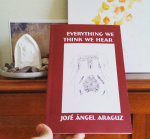
Much of the talk revolved around me reading poems from my book Everything We Think We Hear, and then tying in the little lessons each poem gave me as I worked towards a final draft, lessons about lyrical prose as much as life.
One poem from the book I had planned to but didn’t get a chance to read is “Old Love.” This poem’s first draft came from a dream where I heard the final lines in my head and lived out the final image of talking into a baby carriage. I literally stumbled out of bed and those lines down, but it took a few years to really to where the poem wanted to go. While a lesson in waiting, this poem also became a lesson in honesty, which requires its own waiting sometimes.
Old Love
When I dream of an old love, I let it ride, having already broken off what connected us, and not wanting to go through it all again. I drink my coffee the way they would remember me taking it, for some light and sweet, for others black and with a comment on how I can’t believe how long it took me to take it this way, undiluted, untampered, bitter. With a heat on my tongue, I listen to old love, let my mind wander more than I did when I was with them, knowing I have had this conversation, feeling the answers give over as accommodating as leaves to sunlight. With a green on my tongue, I inevitably mix up the conversations: ask after the father of one whose father was never around; whisper an inside joke I realize too late I never shared. When old love looks at me lost, I ask, Where did you get those, and point sometimes to a set of bow and arrow earrings, sometimes a pair of toucans tattooed on the inside of an arm. Stories of boutiques I paced politely. Stories of a childhood fascination with colorful birds. Don’t you remember? When we run out of small talk, I find myself pushing a baby carriage in which old love has fallen in. Helpless, I look down, only to hear myself doing baby talk, shaking my head, waving my hands, emphatically repeating words, and, in general, speaking in such a way I know I cannot ever make myself understood.
*
This weekend is CantoMundo. I’ll be participating in one of two CantoMundo readings in Austin, TX, details below. If you happen to be in town, stop on by – it promises to be a great time! I’ll be part of the group reading on Saturday.
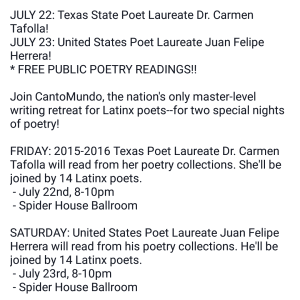
Happy everthinging!
José
July 15, 2016
* singing with jim ferris
Poet of Cripples – Jim Ferris
Let me be a poet of cripples,
of hollow men and boys groping
to be whole, of girls limping toward
womanhood and women reaching back,
all slipping and falling toward the cavern
we carry within, our hidden void,
a place for each to become full, whole,
room of our own, space to grow in ways
unimaginable to the straight
and the narrow, the small and similar,
the poor, normal ones who do not know
their poverty. Look with care, look deep.
Know that you are a cripple too.
I sing for cripples; I sing for you.
*
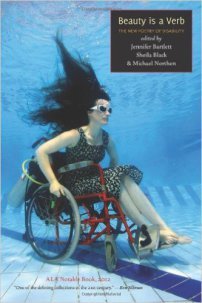 One of the highlights of teaching composition this summer has been engaging with excerpts from the anthology Beauty is a Verb: The New Poetry of Disability. There is a wealth of great poetry in this anthology, which includes the work of Ona Gritz, Hal Sirowitz, and the writer of this week’s poem, Jim Ferris.
One of the highlights of teaching composition this summer has been engaging with excerpts from the anthology Beauty is a Verb: The New Poetry of Disability. There is a wealth of great poetry in this anthology, which includes the work of Ona Gritz, Hal Sirowitz, and the writer of this week’s poem, Jim Ferris.
What I love about this week’s poem, “Poet of Cripples,” is how Ferris takes a singular experience and sings it in such a way that it becomes personal for the reader. The stakes engaged with via the poem quickly become familiar; the speaker’s intimate address of Look with care, look deep, is in the tradition of Whitman’s “Song of Myself.” Poetry becomes, for Ferris as it was for Whitman, a way to access our hidden void and push ourselves to what we would become.
This poem’s momentum makes me think of another Whitman-influenced poet, Pablo Neruda, specifically his lines at the end of “Alianza (Sonata)” where so much intangible and conceptual feeling is evoked through language that is felt in the body:
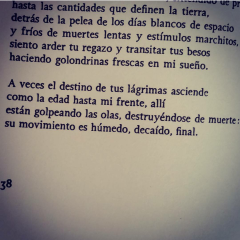
…I feel your lap’s heat and the transit of your kisses
creating fresh swallows in my dreams.
At times the fate of your tears rises
like age up to my forehead, and there
the waves keep breaking, destroyed by death:
its movement is damp, decayed, final.
Both poets meet at the place where language and the body meet to affect each other, like waves making and unmaking the shore.
Happy singing!
José
Goodreads Book Giveaway

Reasons (not) to Dance
by Jose Angel Araguz
Giveaway ends August 07, 2016.
See the giveaway details
at Goodreads.


July 8, 2016
* writing the woods with wislawa szymborska
In the summer course I’m teaching, we have been discussing ideas of writing as performance; that is, what gets going as soon as words are on the page. It’s similar to what William Stafford means when he says, “The moon you are describing is the one you are creating,” which I wrote about in a post from this Spring.
I came across this week’s poem, “The Joy of Writing” by Wislawa Szymborska, and share it here because of the connection it has to these concepts of writing as performance. From the beginning, the poem ties the act of writing to what’s being described, creating a singular conceit of “these written woods.” The metaphor is stretched enjoyably far. What I find most enjoyable of all, at least this week, is the startling nature of the last line: “Revenge of a mortal hand.” In contrast to the title of the poem which sets up low dramatic expectations, Szymborska takes us down to that last line with a sense of mortality and complication that is surprising as well as apt and necessary.
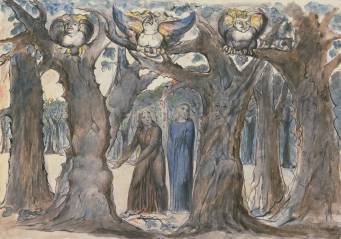
The Joy of Writing – Wislawa Szymborska
Why does this written doe bound through these written woods?
For a drink of written water from a spring
whose surface will xerox her soft muzzle?
Why does she lift her head; does she hear something?
Perched on four slim legs borrowed from the truth,
she pricks up her ears beneath my fingertips.
Silence – this word also rustles across the page
and parts the boughs
that have sprouted from the word “woods.”
Lying in wait, set to pounce on the blank page,
are letters up to no good,
clutches of clauses so subordinate
they’ll never let her get away.
Each drop of ink contains a fair supply
of hunters, equipped with squinting eyes behind their sights,
prepared to swarm the sloping pen at any moment,
surround the doe, and slowly aim their guns.
They forget that what’s here isn’t life.
Other laws, black on white, obtain.
The twinkling of an eye will take as long as I say,
and will, if I wish, divide into tiny eternities,
full of bullets stopped in mid-flight.
Not a thing will ever happen unless I say so.
Without my blessing, not a leaf will fall,
not a blade of grass will bend beneath that little hoof’s full stop.
Is there then a world
where I rule absolutely on fate?
A time I bind with chains of signs?
An existence become endless at my bidding?
The joy of writing.
The power of preserving.
Revenge of a mortal hand.
Translated by S. Baranczak & C. Cavanagh
Happy mortaling!
José
Goodreads Book Giveaway

Reasons (not) to Dance
by Jose Angel Araguz
Giveaway ends August 07, 2016.
See the giveaway details
at Goodreads.


July 4, 2016
* new poem up at cider press review!

Just a quick post to announce the release of the latest issue of Cider Press Review which features my poem “Corpus Christi”!
This particular poem was written during a summer over ten years ago where I lived in my hometown of Corpus Christi, Texas without A/C, which led to many hazy meditations at midnight. That this poem has finally seen the light of day is proof that poems, like roaches, are creatures of survival.
This issue also features stellar work by Samantha Futhey, Gabrielle Campagnano, Lauren Camp, and Geoff Anderson among others. Check out the issue here.
See you Friday!
José
Goodreads Book Giveaway

Reasons (not) to Dance
by Jose Angel Araguz
Giveaway ends August 07, 2016.
See the giveaway details
at Goodreads.


July 1, 2016
* a makeshift anniversary w/ lucille clifton
A year ago, I was in the hospital due to some GI issues that brought me close to dying. I have been wondering how I would feel come this makeshift anniversary. Strangely enough, I am in the same mix of life as then.
That said, I do see myself in a different place in the light of the many gifts since then: the gift of my first wedding anniversary; the gift of seeing Everything We Think We Hear printed as well as having The Book of Flight soar into the (e)world; the gift of doing poetry readings in my hometown again; the gift of having my family hear me read poems and share what I love; the gift of new projects and new friends.
This makeshift anniversary has brought up complicated feelings to say the least. And yet, the feelings aren’t exactly unmanageable or strange. When I think of poets able to navigate this terrain of human fatefulness, Lucille Clifton comes readily to mind.
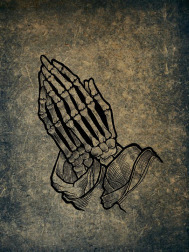 In the poem below, Clifton describes “sorrows” through imagery that evokes a mix of angels and the duende. It’s exactly this mix of the living and the dying that poetry manages to bring to understanding one lyric at a time.
In the poem below, Clifton describes “sorrows” through imagery that evokes a mix of angels and the duende. It’s exactly this mix of the living and the dying that poetry manages to bring to understanding one lyric at a time.
sorrows – Lucille Clifton
who would believe them winged
who would believe they could be
beautiful — who would believe
they could fall so in love with mortals
that they would attach themselves
as scars attach and ride the skin
sometimes we hear them in our dreams
rattling their skulls — clicking
their bony fingers
they have heard me beseeching
as i whispered into my own
cupped hands — enough — not me again
but who can distinguish
one human voice
amid such choruses
of desire
*
Happy chorusing!
José
Goodreads Book Giveaway
Giveaway ends August 07, 2016.
See the giveaway details
at Goodreads.


June 30, 2016
* goodreads giveaway!
Goodreads Book Giveaway

Reasons (not) to Dance
by Jose Angel Araguz
Giveaway ends August 07, 2016.
See the giveaway details
at Goodreads.
Just a quick post to announce that I’m doing a Goodreads giveaway of my chapbook Reasons (not) to Dance (FutureCycle Press)! Check out the above links to find out how to enter.
I’m excited to try this kind of giveaway out! Looking forward to sharing my work further.
See you Friday!
José


June 24, 2016
* meditating with yannis ritsos
In my recent interview as part of my Distinguished Poet feature for The Inflectionist Review, I spend some time talking about the poet Yannis Ritsos and his poem “Protection” which I wrote about two years ago here.
I feel that ever since discovering Ritsos’s work years ago I keep coming back. The most recent return has come in the form of my morning meditations which consist of my reading poems aloud for about 5-10 minutes. I discovered this practice in talking with Ani about some of the physical struggles with meditation, how sitting in one spot and focusing on breathing can sometimes bring more anxiety and pain than, say, reading poems aloud.
Because of the role poetry has played in my life, reading poems aloud for the sheer focused pleasure of it feels like returning home. Approaching it like meditation, I let myself read as I used to growing up, sinking into the words, not worrying about exacting meaning, rather, the meaning instead rising from the active engagement with words. Giving myself over in this way, I believe, takes me to a similar place of selflessness as meditation – though I wouldn’t exactly call it a substitute or equivalent, more a cousin activity, closer to prayer.
 I made it through most of Spring reading through Jack Gilbert’s Collected Poems and have moved on to Ritsos recently. In the interview, I speak of a fateful vividness in the work of Crane and Ritsos, a characteristic that can be found in the poem below. The poem’s narrative moves from a childhood scene observed from a distance, the details moving in the first two stanzas with a similar distance. The third stanza, on the other hand, zooms in and in four lines gives a fateful image that lifts the lyric beyond words on the page.
I made it through most of Spring reading through Jack Gilbert’s Collected Poems and have moved on to Ritsos recently. In the interview, I speak of a fateful vividness in the work of Crane and Ritsos, a characteristic that can be found in the poem below. The poem’s narrative moves from a childhood scene observed from a distance, the details moving in the first two stanzas with a similar distance. The third stanza, on the other hand, zooms in and in four lines gives a fateful image that lifts the lyric beyond words on the page.
A Myopic Child – Yannis Ritsos
The other kids romped around the playground: their voices
rose up to the roofs of the quarter, also the “splock” of their ball
like a globular world, all joy and impertinence.
But he was reading the whole time, there in the spring window,
within a rectangle of bitter silence,
until he finally fell asleep on the window sill in the afternoon,
oblivious to the voices of those his own age
and to premature fears of his own superiority.
The glasses on his nose looked like
a little bike left leaning against a tree,
off in a far-flung, light-flooded countryside,
a bike of some child who had died.
*
Happy meditating!
José


June 20, 2016
* interview & poetry feature at The Inflectionist Review!
 Just a quick post to announce that I was selected for the Distinguished Poet feature for the latest issue of The Inflectionist Review! Along with a selection of poems, I also participated in an interview where I discuss my writing process as well as my views on the current state of poetry in America.
Just a quick post to announce that I was selected for the Distinguished Poet feature for the latest issue of The Inflectionist Review! Along with a selection of poems, I also participated in an interview where I discuss my writing process as well as my views on the current state of poetry in America.
The Inflectionist Review has provided an engaging and supportive community for years now and I am proud to have my work be part of the conversation.
Special thanks to editors A. Molotkov and John Sibley Williams for their support and insightful questions!
See you Friday!
José


June 17, 2016
* where the poet is: a personal note
 In an essay entitled “Tough Eloquence,” poet Yusef Komuyakaa writes about the life and work of Etheridge Knight. There’s a story and poem towards the end of the essay that has always stayed with me throughout the years:
In an essay entitled “Tough Eloquence,” poet Yusef Komuyakaa writes about the life and work of Etheridge Knight. There’s a story and poem towards the end of the essay that has always stayed with me throughout the years:
“Etheridge Knight died in March 1991. For more than a year before, at various readings, he’d say a poem by Melissa Orion, “Where is the Poet?” He often used to say he wished he’d written it. Of course, he had memorized the poem, as if reciting his own elegy:
So I went to Soweto and asked the wounded
Have you seen my friend the poet?
Oh no, answered the wounded, but we’re longing to
see him
before we die
Maybe you should go to the prisons, they said
where there is loneliness, the poet should be”
Orlando has been on my mind all week, in my conversations with Ani as much as in my conversations on social media, but also in my heart, in my silences and loneliness. In my classroom, we have been having some difficult conversations about problematization and empathy, and I am proud of my students’ generosity to have these conversations, to discuss difficult issues with open minds. It’s done much for my spirit.
Through the many conversations, I have not had to wonder where the poet is. This piece by Denice Frohman as well as this poem by Roy G. Guzmán and this one by Christopher Soto (aka Loma) have meant much to me and others this week, and I share them for anyone in need of insight, solace, or catharsis.
I’d like to take this opportunity to thank everyone who reads this blog and shares in the community, poetry, and positive energy of the weekly posts. I write driven by a faith in poetry, in words being a place where the ideas and emotions of life that overwhelm us at times can meet, mingle, and make a sort of sense to us, glimpses of the reality we share.
To everyone who stops by, thank you for sharing.
Abrazos,
José


June 14, 2016
* new poem up at Borderlands: Texas Poetry Review!
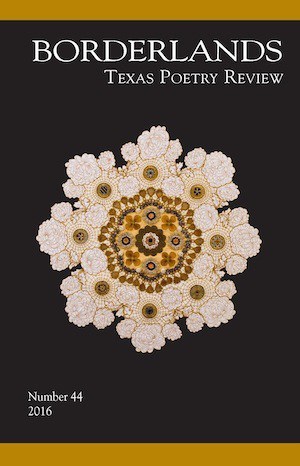 Just a quick post to share my poem “About Languages” originally published in Borderlands: Texas Poetry Review Issue 42.
Just a quick post to share my poem “About Languages” originally published in Borderlands: Texas Poetry Review Issue 42.
Borderlands has also made available poems by Joshua Gage, Eric Fisher Stone, Celeste Guzmán Mendoza and Rosebud Ben-Oni.
Check them all out here.
Borderlands Issue 44 (pictured here) features my poem “Fisherman” and is available for purchase here.
Special thanks to Ryan Sharp and everyone at Borderlands for their continued support and community!
See you Friday!
José







